Policy and initiatives to protect the fundamental rights of all
Basic Policy
Human Rights Awareness Promotion System
Human Rights Education
Prohibition of Child Labor and Forced Labor
Harassment Prevention
Freedom of Association
The Guiding Principles on Business and Human Rights (UNGP) adopted by the United Nations in 2011 make it clear that every business enterprise has a responsibility to respect human rights. Worldwide, the body of human rights-related laws, regulations, and rules for companies is evolving. In recent years, human rights initiatives in accordance with the UNGP have imposed progressively greater mandatory obligations on companies, and fulfillment of those obligations is becoming increasingly important from the perspective of business continuity.
From the viewpoint of the sustainable enhancement of corporate value, we established respect for human rights in the value chain as one of the material sustainability issues under SF2030. We believe that human rights initiatives throughout the entire value chain will become an indispensable component of enhancing corporate value.
Based on this background, we established a new human rights policy based on the UNGP approach in March 2022.
OMRON Group (hereinafter referred to as “OMRON”), which consists of OMRON Corporation and its subsidiaries, has established this OMRON Human Rights Policy (hereinafter referred to as “this Policy”), to fulfill its corporate responsibility in respecting human rights in accordance with “OMRON Principles”, and to ensure that our management practices and actions are always in line with those of the international community.
This Policy applies to all executives and employees of OMRON in order to ensure respect towards the human rights of all stakeholders involved in the OMRON Group value chain. We also expect all business partners of OMRON, including suppliers and distributors, to understand and support the content of this Policy, and will continue to work to ensure that this Policy is respected.
We declare that OMRON will carry out human rights due diligence in accordance with the United Nations Guiding Principles on Business and Human Rights and will avoid causing or contributing to adverse human rights impacts in our value chain.
To meet the above-mentioned commitment, OMRON respects human rights as those expressed in the International Bill of Human Rights, the International Labor Organization (ILO) Declaration on Fundamental Principles and Rights at Work, and the Organization for Economic Cooperation and Development (OECD) Guidelines for Multinational Enterprises. OMRON Corporation has also signed the United Nations Global Compact and upholds the 10 Principles of the United Nations Global Compact. We will respect the above internationally recognized human rights principles based on compliance with all the laws and regulations of each country and region in which we operate.
OMRON will identify human rights-related issues to focus on throughout all our business processes, including development, procurement, production, distribution, and sales, and take the appropriate measures to deal with them.
1. Discrimination or Other Unreasonable Treatment
OMRON does not tolerate any discrimination, acts that hurt the dignity of an individual, harassment or treat others in an unreasonable manner on the basis of national origin, citizenship, color, race, belief, religion, ancestry, marital status, gender, disabilities, age, sexual orientation, gender identification, place of birth, social status, or any other basis prohibited by local law.
2. Forced Labor and Child Labor
OMRON does not tolerate any forced labor or child labor including slavery and human trafficking.
3. Privacy and Personal Information
OMRON respects the privacy of all persons and will use all reasonable care to maintain the privacy and confidentiality of personal data. OMRON complies with the laws and regulations of countries and regions related to the protection of personal information and does not tolerate unauthorized disclosure of or access to such data.
4. Harassment
OMRON does not tolerate any action that causes physical or mental distress such as sexual harassment or power harassment*.
5. Occupational Safety and Health
OMRON will strive to create and maintain a safe and healthy working environment where persons working in each workplace can fully demonstrate their abilities.
6. Ethical Use of Technology
OMRON will take account of potential impact for human rights caused by technologies such as AI, robotics and IoT, and will take advantage of them appropriately to avoid problems, including but not limited to cause of accident, discrimination and invasion of privacy.
All persons at OMRON, from operation-level staff members to senior management, will work together to establish a system ensuring the execution of our responsibility for respecting human rights at the global level. As for the system to assume the responsibility covering OMRON’s entire value chain, the Senior General Manager of the Global Human Resources and Administration HQ and the Senior General Manager of the Global Procurement, Quality and Logistics HQ and the Senior General Managers of the related business divisions, who have been delegated authority from the President and CEO, will be responsible for promoting respect for human rights for OMRON companies and supply chains, respectively. Important points concerning our commitment fulfillment for respecting human rights will be decided by the Board of Directors. The execution status of this decision will be reported to the Board of Directors by the President and CEO and monitored and supervised by the Board of Directors.
To fulfill our responsibility for respecting human rights, OMRON will carry out human rights due diligence in accordance with this Policy. OMRON will assess impacts that our activities have on human rights and will commit to avoid or mitigate any adverse impacts identified. OMRON will strive to use its leverage in the impact of our business relationships on human rights that are directly linked to the operations, products or services of the group so that this Policy will be respected.
Should it become apparent that we have caused or have contributed to adverse impacts on human rights through any of our business activities, OMRON will provide for remediation through appropriate processes.
OMRON will implement activities set forth in this Policy through consultation and communication with various internal and external stakeholders.
OMRON aims to realize fair and transparent management practices. We will disclose results from and progress of the human rights due diligence we carry out as appropriate exercising the utmost care for the affected stakeholders and trade secrets.
In order to ensure that this Policy is embedded within all members across OMRON, OMRON provides appropriate education and training to all executives and employees. We will also encourage business partners such as suppliers and distributors to fully comprehend this Policy.
This Policy was formulated with the approval of the Board of Directors of OMRON Corporation. To effectively address human rights issues that may change in response to social trends and the changing business environments, this Policy will be undergone periodic reviews and revisions.
(Established: March 1, 2022)
OMRON is working to build a system in which management and front-line employees work together to fulfill their responsibility to respect human rights on a global basis.
The President & CEO delegates authority to each executive division head, who is then responsible for promoting respect for human rights, ensuring responsibility through the entire value chain. The President & CEO also reports to the Board of Directors on matters that are important in fulfilling our commitment to respect for human rights, and the Board of Directors monitors and supervises these matters. This process ensures responsibility throughout the entire value chain.
In fiscal 2023, we appointed a director in charge of human rights and established a Human Rights Steering Committee. The director in charge of human rights and the heads of each executive division participate in this committee, which is under the authority of the Sustainability Committee. This Human Rights Steering Committee discusses the introduction of measures, their statuses, and issues necessary to achieve the goals of the SF 1st Stage Medium-Term Management Plan. They additionally work on high-cycle initiatives by accelerating decision-making.
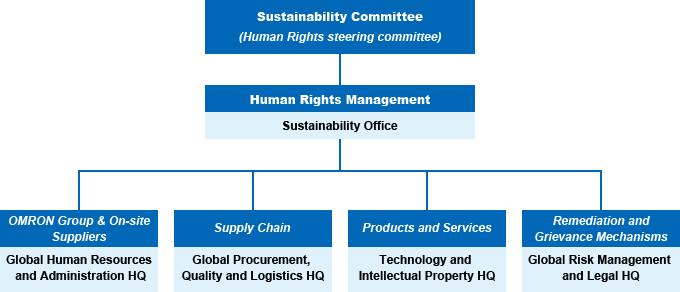
OMRON established a Human Rights Policy in 2022 which respects the UN Guiding Principles on Business and Human Rights and fulfills its corporate responsibility to respect human rights by developing procedures to identify, prevent, mitigate, and remedy adverse human rights impacts.
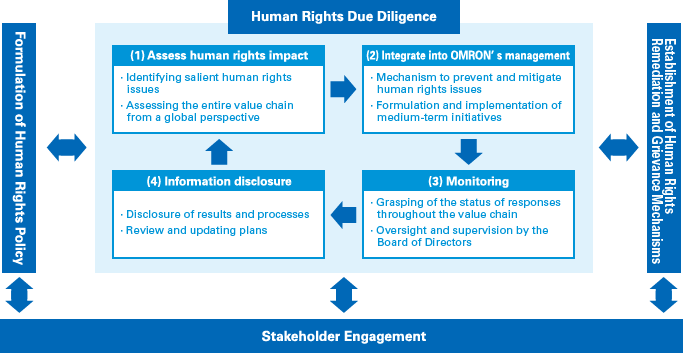
As a part of its human rights due diligence process, OMRON conducts company-wide human rights impact assessments and does a systematic periodic review of the risk mapping of potential issues.
With the advice of an external consulting firm, we at OMRON conducted a human rights impact assessment in fiscal 2017 to determine where in our supply chain human rights risks were most likely to occur. As a result, we identified people working in our production plants and at suppliers in Japan, China, and Southeast Asia as being most at risk. Within these areas, we assumed the potential risk was particularly high for temporary workers, contract workers, and foreign workers involved in production.
In fiscal 2021, we reviewed our human rights initiatives under VG2.0, our medium-term management plan in operation from fiscal 2017 to fiscal 2020. We reassessed key human rights issues relevant to our businesses. We also assessed the impact of OMRON technologies on human rights. We clarified the results of these assessments as Specific Human Rights Issues in the Human Rights Policy established in March 2022.
In fiscal 2022, we conducted a group-wide human rights impact assessment based on the UNGP in collaboration with the Business for Social Responsibility (BSR), a US non-profit organization. In conducting this assessment, we evaluated and identified human rights risks that the OMRON Group may cause or contribute to through its business activities in its value chain, including its supply chain.
Our first step included surveying international standards, and industry and stakeholder trends, as well as interviewing 15 divisions throughout OMRON, including regional headquarters outside Japan. After comprehensively identifying human rights issues based on international human rights standards, we narrowed issues down to those specific to the electrical and electronics industry. We also identified up to 19 issues in our value chain that could affect rights holders. Finally, we mapped and prioritized risks based on risk severity and relevance to business, enabling the identification of seven priority issues (salient human rights issues) to be addressed.
In fiscal 2023, each responsible department has formulated action plans to address the seven issues identified in the FY2022 Human Rights Impact Assessment.
Our assessments are based on the OECD Due Diligence Guidelines, and we use the Self-Assessment Questionnaire and other tools provided by the Responsible Business Alliance (RBA).
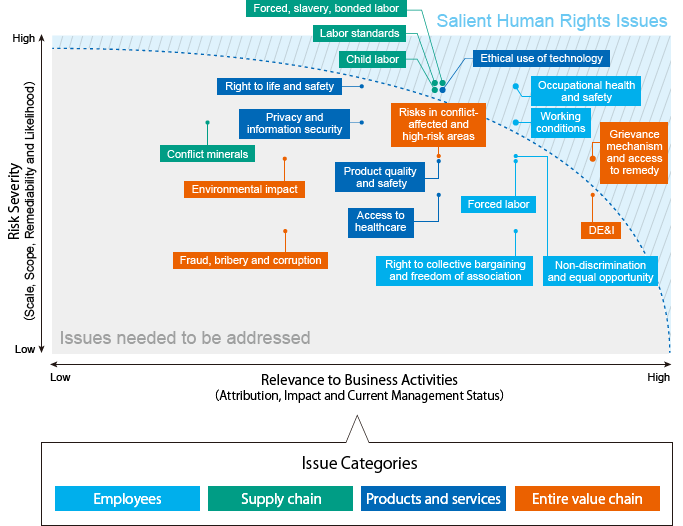
| Tier1 | Tier2 | |
|---|---|---|
| Employees |
|
|
| Supply chain |
|
|
| Products and services |
|
|
| Entire value chain |
|
|
We at OMRON identified respect for human rights as a material sustainability issue in our 2030 Long-Term Vision. We set long-term targets through 2030, as well as targets under our SF 1st Stage medium-term management plan (fiscal 2022 to fiscal 2024). During SF 1st Stage, we will ensure that global employees are familiar with and understand the new OMRON Human Rights Policy. We will strive to establish a global human rights governance system, conducting human rights due diligence and establishing a human rights remedy mechanism in line with the UNGP.
In addition, we conduct risk management based on a common Group framework called Integrated Risk Management, and defined human rights risk as one of the significant Group risks. In fiscal 2022, we identified human rights risk as among the risks with utmost importance, or S-rank risks in our definition, and are stepping up efforts in this context.
We conduct annual assessments of our production sites and suppliers identified as having high human rights risks. These assessments use RBA assessment tools and are based on human rights impact assessments conducted in the past. We engage in corrective and preventive activities to address actual and potential human rights risks.
At OMRON, we conduct surveys and assessments of the status of global production sites using the RBA Self-Assessment Questionnaire (SAQ) and other self-assessment tools. In fiscal 2022, we conducted surveys and assessments of the status of 24 OMRON Group production sites in Japan, China, the Asia-Pacific, Europe and North America using the RBA SAQ in addition to other self-assessment tools. These initiatives continued in fiscal 2023.
OMRON made efforts to improve work environments in fiscal 2022 based on the results of these surveys and assessments. As part of our efforts, we continuously educated employees about harassment, took disciplinary actions when necessary, checked health and safety standards for employee dormitories, shortened and improved working hours as we improved productivity, and reviewed temporary staffing agencies regarding the employment of migrant workers. OMRON also conducted interviews on the employment conditions of foreign technical intern trainees in Japan. Going forward, we plan to conduct third-party audits by fiscal 2024 at production sites in China and Malaysia, where human rights risks are considered highly probable, as well as at domestic sites that employ foreign technical intern trainees in Japan.
We conduct periodic surveys of suppliers as well to prevent human rights risks in the supply chain. Specifically, we ask suppliers to self-assess compliance with the OMRON Group Sustainable Procurement Guidelines, including human rights compliance and labor practices. We then request any improvements required. Assessments are conducted annually for 50 critical suppliers and at least once every three years for other suppliers.
The Sustainability Promotion Committee assesses our efforts on sustainability issues annually, including human rights issues, submitting a report to the Executive Council and the Board of Directors.
We report our human rights initiatives to all stakeholders through our website, integrated reports, and annual securities reports.
In its Sustainability Policy, OMRON states: “We cultivate strong relationships with all of our stakeholders through responsible engagement.” In our human rights initiatives, we will engage in periodic dialogues with external human rights experts to deepen our understanding of respect for human rights in accordance with international standards and increase the effectiveness of our initiatives.
Ms. Akiko Sato
Attorney, Kotonoha Sogo Law Office, Certified NPO Human Rights Now

Compared to companies in certain other countries, most Japanese companies are only just starting full-fledged initiatives in terms of human rights awareness. In these circumstances, it is encouraging to see that OMRON is addressing human rights issues, focusing on the centrality of people based on its corporate philosophy. In order to strengthen OMRON’s initiatives, I believe two things are important: One is to value the “why” aspect: why it is necessary to address human rights issues. Another is to consciously incorporate the perspective of rights holders into business, considering whose rights and what rights are concerned in the course of management and business activities. Disclosure of human rights risks also leads to external evaluation that the company has identified the risks. Appropriate disclosure of what the company is doing, what it will do, and what it needs to do, rather than disclosure after implementation of all measures has been completed, will help build trust among stakeholders.
Ms. Asako Nagai
Managing Director, BSR (Business for Social Responsibility)

OMRON established the OMRON Human Rights Policy as part of its management practices in line with its Corporate Philosophy and is steadily advancing initiatives in line with international Business and Human Rights. The Company works towards the medium to long term, clarifying its system of responsibility, including for the board of directors, and setting targets for 2030. At the same time, OMRON conducts commendable company-wide human rights impact assessments in line with the UN Guiding Principles on Business and Human Rights as part of its human rights due diligence and promotes initiatives at its own sites and in certain supply chains. Going forward, I expect OMRON to further strengthen its activities in the following three main areas: 1) continuous risk mitigation in the company and its supply chain, 2) risk mitigation in the use of its products and services, including the use of responsible technology (such as AI) and customer due diligence, and 3) the establishment of stakeholder engagement.
In Japan, to enhance human rights awareness more effectively and efficiently, the OMRON Group established the Basic Rules for Human Rights Awareness Promotion as common rules for all Group companies in Japan. In accordance with these rules, the Central Human Rights Committee chaired by Senior General Manager of Global Human Resources and Administration HQ has been established at OMRON headquarters. Under this core organization, a human rights committee has been set up at each OMRON Corporation site and each of the Group companies in Japan, working to raise human rights awareness among all employees in Japan.
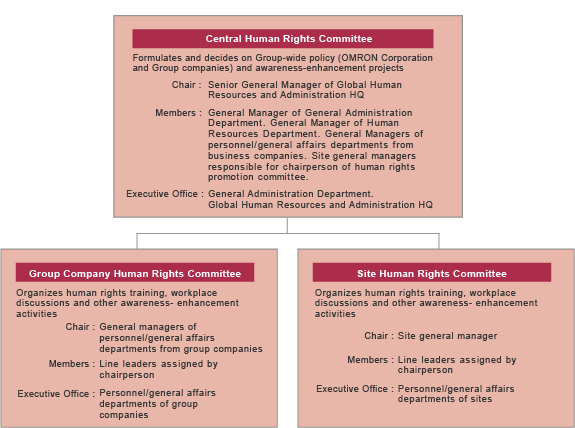
The OMRON Group in Japan conducts human rights training for all employees, including part-timers and temporary workers, designed to raise awareness of human rights. Rank specific human rights training programs are also available for new employees, mid-career recruits, new senior managers, and directors and executive officers.
Human rights training in fiscal 2022 was conducted via e-learning under the theme Respect for Human Rights in the Value Chain. In addition to addressing human rights issues that need attention as OMRON conducts its business globally, the presentation also explained the newly formulated OMRON Human Rights Policy.
In order to produce products without human rights violations, we need to look not only at our own company but also at our business partners.
In addition to e-learning, group discussions based on the video were also held to promote mutual learning. As one of the participants commented, “I learned that human rights issues can occur in all business processes throughout the entire the value chain”, many participants responded that they gained empathy and awareness.
We provide a human-rights related questionnaire to all participants after the human rights training, taking any necessary remedial measures immediately and as appropriate.
We also conducted human rights awareness training to a wider range of workers, providing onsite contractors with the same training for the Group employees. The Group widened access to remedies, such as human rights consultations and compliance hotline, to cover all onsite workers as well, announcing the availability via posters and other media. The OMRON Group will keep working so that everyone at the OMRON sites is treated with respect and dignity and can work securely and safely.
Each regional headquarters outside Japan takes the lead in human rights awareness activities. We provide the same training to contract employees working outside Japan that we provide to our own employees. In order to facilitate awareness, we also display posters and use other means to make our compliance hotline and other remedy systems known to subcontractor employees.
Global regulations and societal expectations regarding human rights have become more concrete. Supply chain management and responses to external evaluations are increasingly prioritized as management responsibilities in addition to compliance with laws, regulations, and international standards. Respect for human rights must be addressed throughout the value chain. As such, top management must have an in-depth understanding of international standards and social demands in business and human rights, and link this understanding to more effective initiatives. We provide training and information to directors and corporate auditors as necessary to enable them to properly fulfill their roles and responsibilities.
OMRON provides training and information to directors and internal members of the Audit & Supervisory Board as necessary to enable them to properly fulfill their roles and responsibilities. In the first half of 2023, we invited an external human rights expert to hold a study session titled, Increasing Responsibility to Respect Human Rights and the Expected Role of the Board of Directors. This session deepened their understanding through discussion on how to respond to increasingly complex and diverse human rights issues.
The OMRON Group Human Rights Policy stipulates that the Group will not engage in discrimination, acts that offend personal dignity, harassment, or other unfair treatment of any kind, regardless of nationality, citizenship, place of birth, race, color, creed, religion, ancestry (ethnicity), marital status, gender, sexual orientation, gender identity, disability, age, social status, or other grounds specified by local laws and regulations.
The OMRON Human Rights Policy prohibits all forced labor and child labor, including slavery and human trafficking. OMRON Group Sustainable Procurement Guidelines prohibit forced labor in our supply chain, including slavery and human trafficking, in our supply chain. We require all suppliers to comply with these guidelines.
The OMRON Group Human Rights Policy declares that we respect the privacy of each individual, handle personal information with the utmost care, comply with national and regional laws and regulations related to the protection of personal information, and that will not tolerate leaks or unnecessary attempts to obtain personal information.
Under the supervision of the director in charge of cyber security, the general manager of the Global Risk Management and Legal HQ is responsible for the management of confidential and personal information. Divisions established under the supervision of the general manager monitor trends in the laws and regulations of each country and the status of the OMRON Group, pursuing any measures necessary.
We conducted a human rights impact assessment in fiscal 2021 regarding the way our AI, robotics, IoT, and other technologies affect human rights.
In fiscal 2022, we began formulating an AI Ethics Policy based on the results of this assessment and are currently developing internal rules to enact this policy in our business.
We at the OMRON Group (in Japan) have established consultation desks for human rights at all business locations. We appoint sexual and power harassment advisors, human rights committee members, and those in charge of human rights issues from among our employees. By posting these contacts and departments through the intranet and business office bulletin boards, as well as offering one-on-one, telephone- or email-based consultation, we are working to create an environment in which anyone can feel at ease and comfortable to talk to.
When advice is sought, the Group works to solve issues based on the defined, prepared escalation process, specifically as follows:
The OMRON Group implements a global Whistleblower System. This system enables employees to report their concerns to internal reporting offices located in and out of Japan and seek advice on discrimination, harassment, and other human rights issues, as well as violations of laws, regulations, internal rules, and unethical behavior. Reports may be made anonymously unless prohibited by the laws and regulations of the respective countries.
Information received through the system is kept strictly confidential, and we guarantee that whistleblowers will not be disadvantaged as a result of their reporting. The OMRON Group confirms the details of the report in a neutral and fair manner and takes the appropriate measures.
The OMRON Group has established a hotline to accept reports from suppliers on compliance-related problems involving OMRON purchasing departments, as well as their opinions, in order to ensure the strict maintenance of compliance in-house.
The OMRON Group joined the Japan Center for Engagement and Remedy on Business and Human Rights (JaCER) as a full member in fiscal 2022. JaCER offers the Engagement and Remedy Platform, a non-judicial grievance platform in compliance with the UN Guiding Principles on Business and Human Rights.
In addition to the aforementioned internal and external desks, the OMRON Group accepts grievances and consultations on human rights from all stakeholders through this dialogue and relief platform. Stakeholders include local communities, customers, and secondary and subsequent suppliers with whom we have no direct business relationship, through this dialogue and relief platform. The reporting platform is offered in Japanese, English, and Chinese. OMRON strives to protect the privacy and confidentiality of whistleblowers and guarantees that they will not be subjected to retaliation or other disadvantageous treatment as a result their reporting. Anonymous reporting is also available, allowing whistleblowers to use the system with peace of mind. Appropriate measures will be taken based on a neutral and fair investigation, and the results and progress will be posted on the Grievance List on the JaCER website.
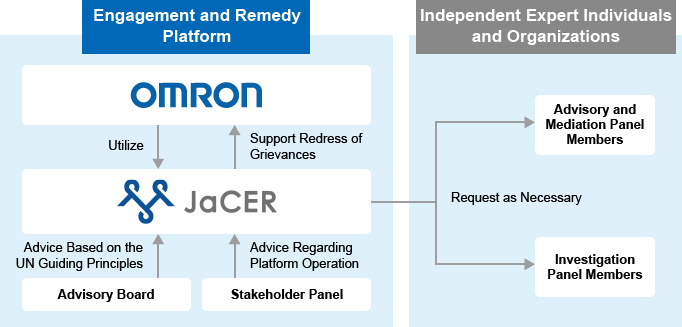
We at the OMRON Group disclose contact information on our corporate website to respond to inquiries from customers, shareholders, investors, and other stakeholders.